Abstract
Data from English families confirms the probable linkage of the loci for autosomal dominant type I hereditary motor and sensory neuropathy (HMSN) and the Duffy blood group. The locus for autosomal dominant type I HMSN is in chromosome 1 near the centromere, about 15 centimorgans from the Duffy locus. The linkage between type I HMSN and the Duffy locus and the two recombinants found between Duffy and type II HMSN support the hypothesis that there are at least two genetic variants of autosomal dominant HMSN.
Full text
PDF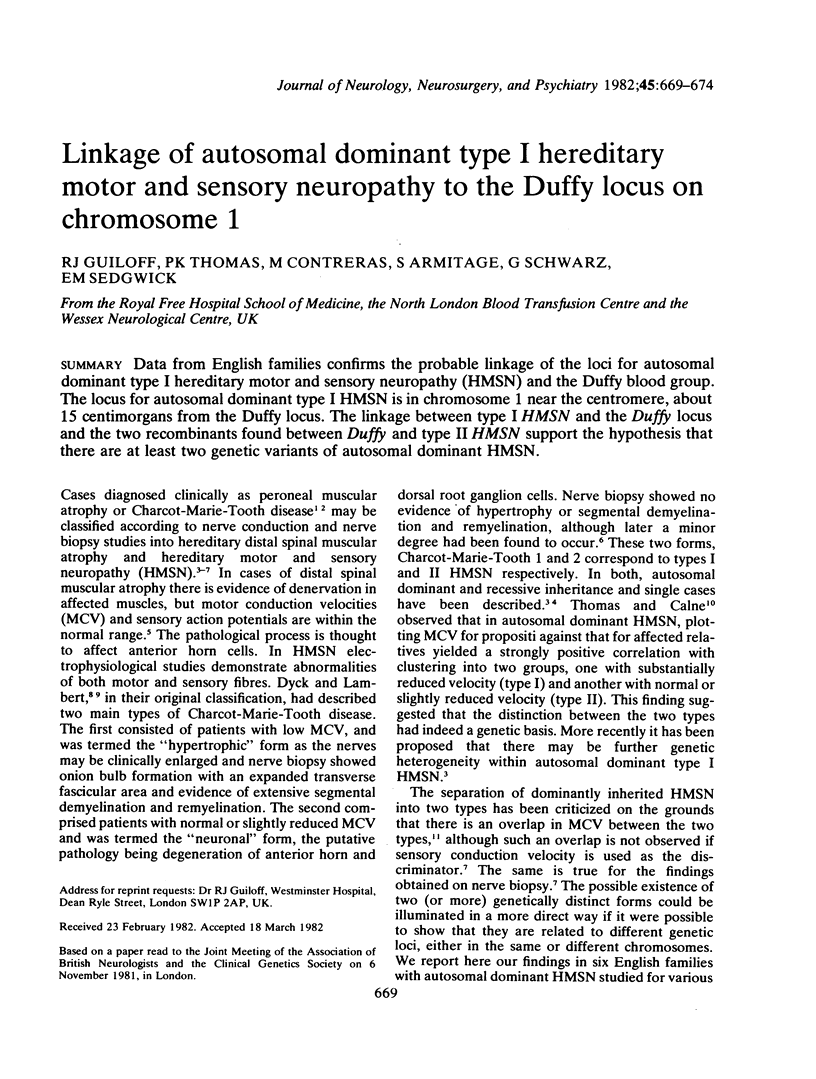
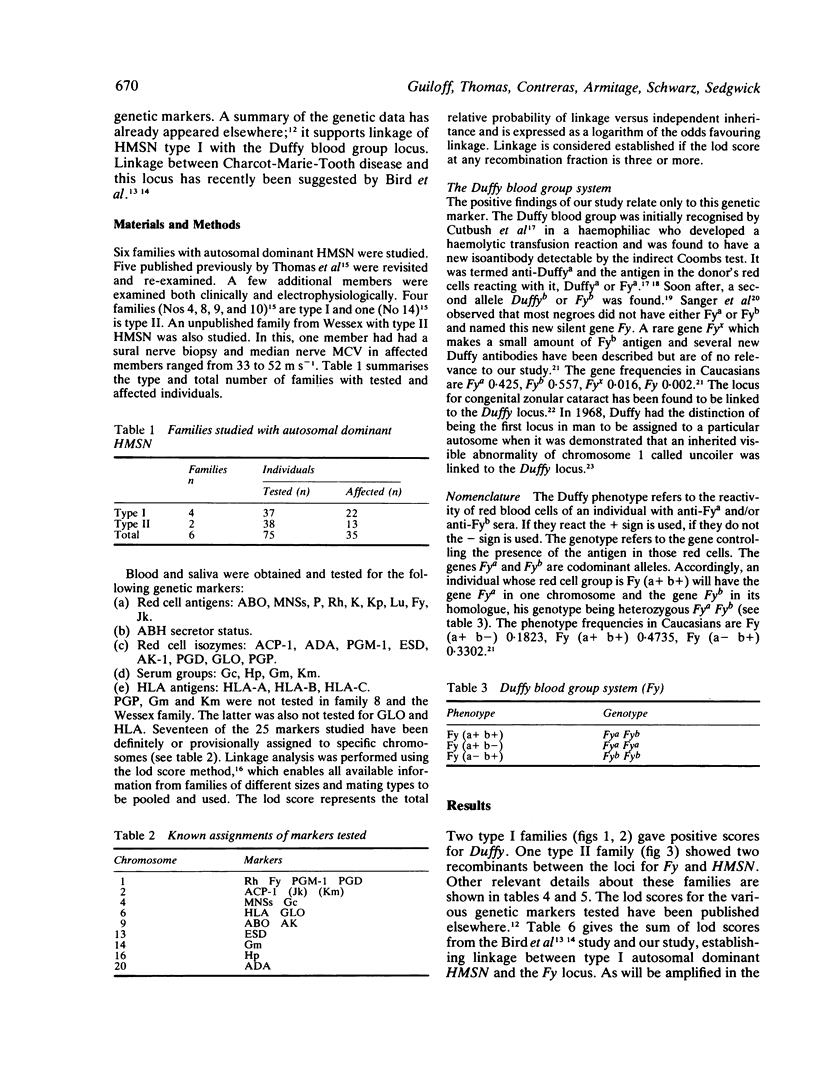
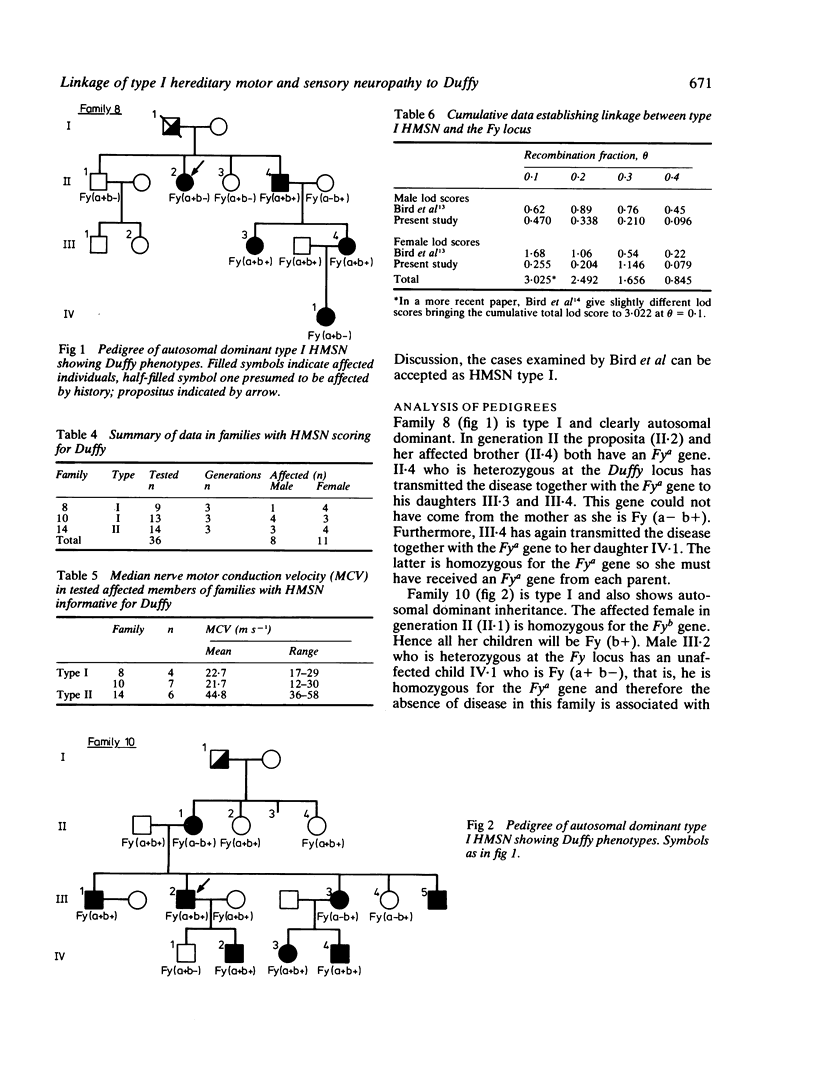
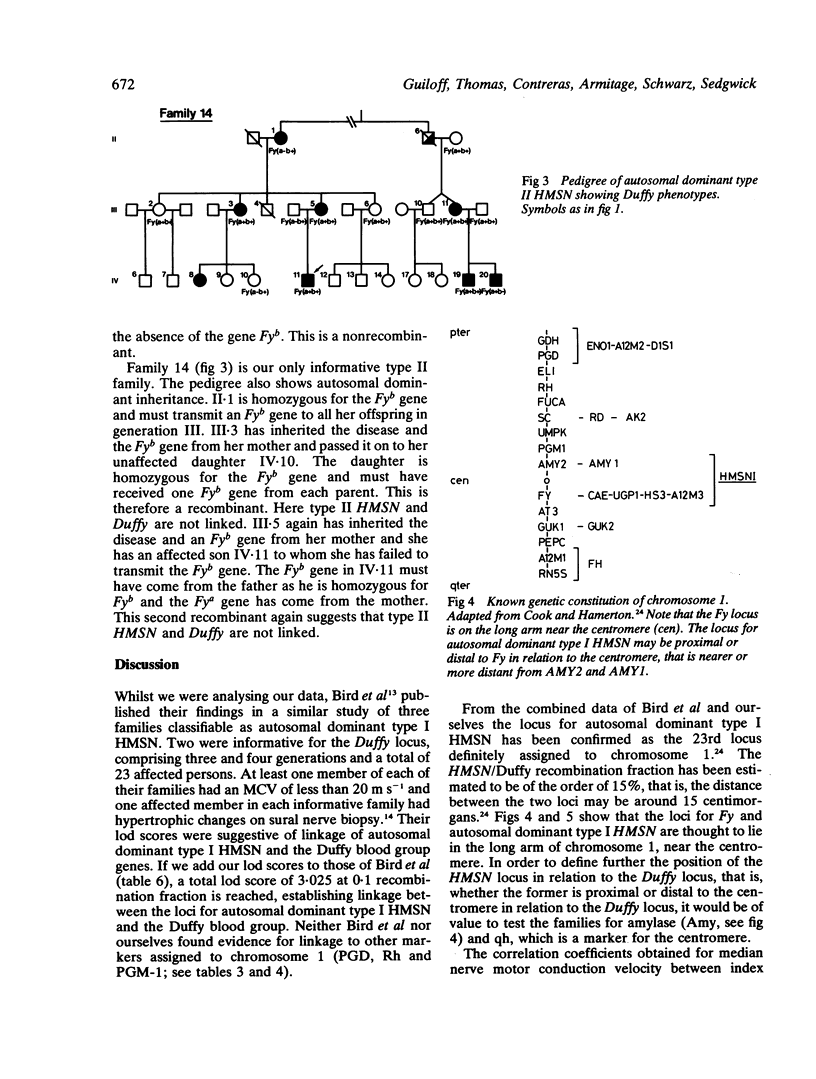
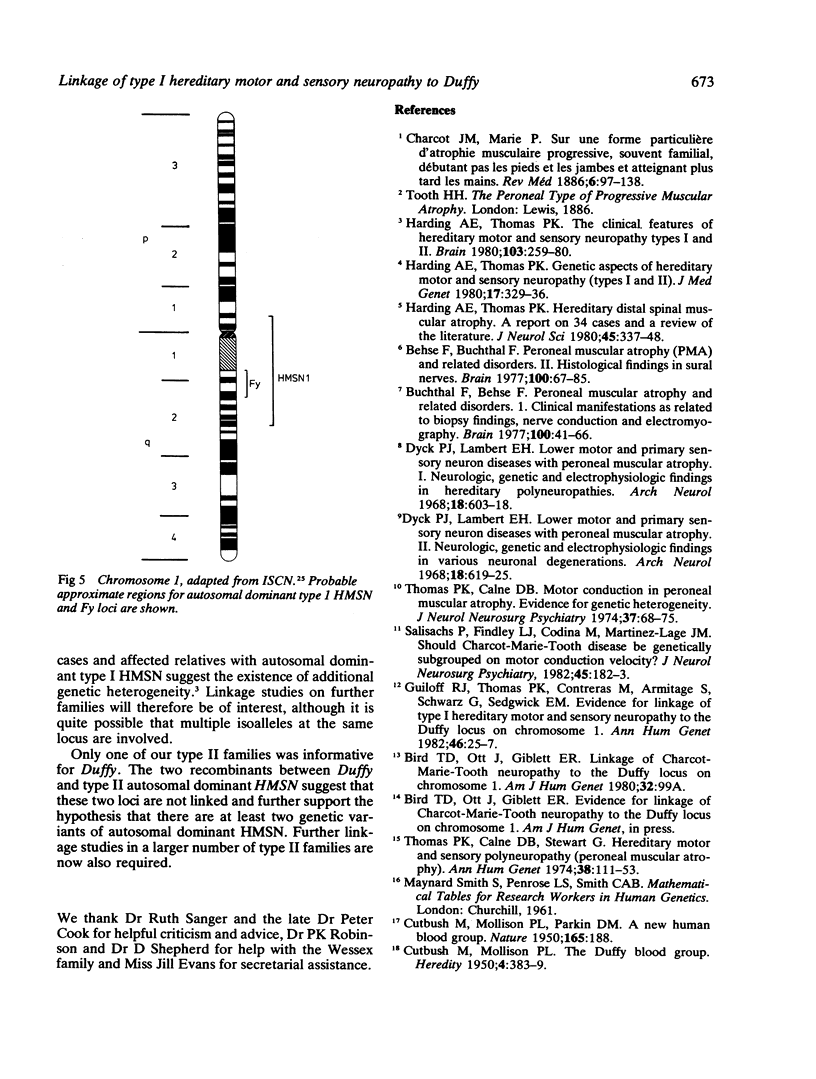
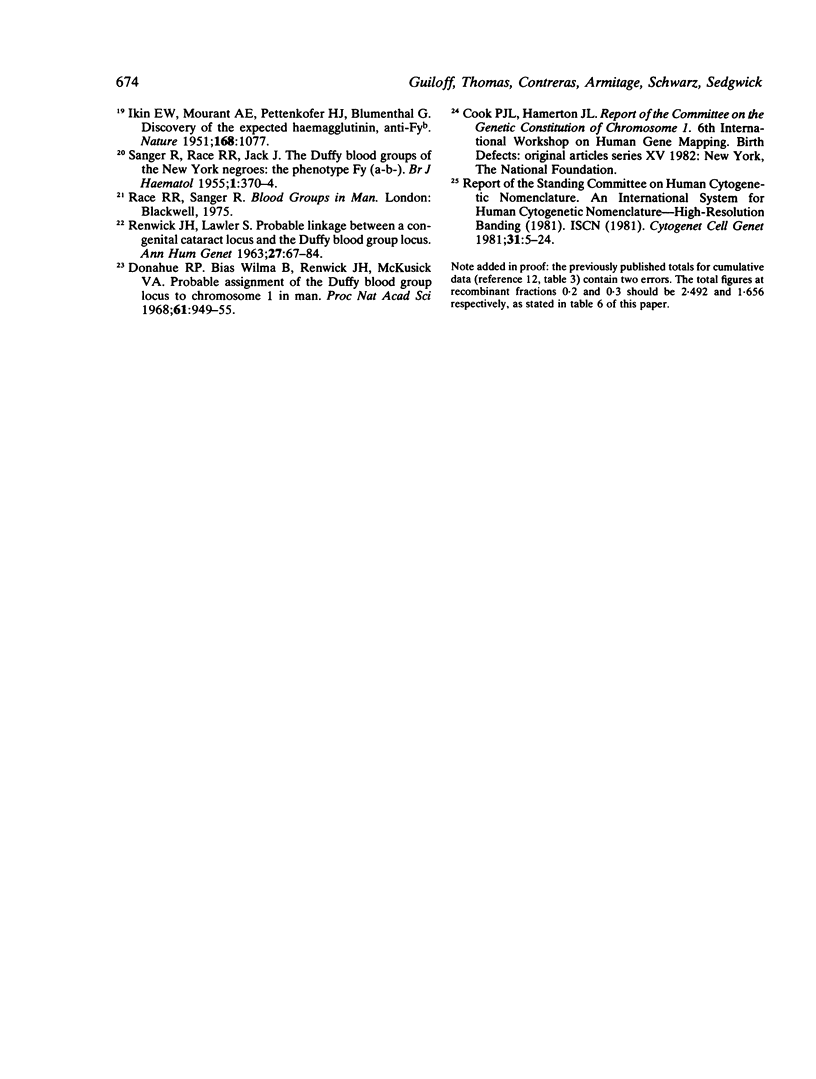
Selected References
These references are in PubMed. This may not be the complete list of references from this article.
- Behse F., Buchthal F. Peroneal muscular atrophy (PMA) and related disorders. II. Histological findings in sural nerves. Brain. 1977 Mar;100(Pt 1):67–85. doi: 10.1093/brain/100.1.67. [DOI] [PubMed] [Google Scholar]
- Buchthal F., Behse F. Peroneal muscular atrophy (PMA) and related disorders. I. Clinical manifestations as related to biopsy findings, nerve conduction and electromyography. Brain. 1977 Mar;100(Pt 1):41–66. doi: 10.1093/brain/100.1.41. [DOI] [PubMed] [Google Scholar]
- CUTBUSH M., MOLLISON P. L. The Duffy blood group system. Heredity (Edinb) 1950 Dec;4(3):383–389. doi: 10.1038/hdy.1950.31. [DOI] [PubMed] [Google Scholar]
- Donahue R. P., Bias W. B., Renwick J. H., McKusick V. A. Probable assignment of the Duffy blood group locus to chromosome 1 in man. Proc Natl Acad Sci U S A. 1968 Nov;61(3):949–955. doi: 10.1073/pnas.61.3.949. [DOI] [PMC free article] [PubMed] [Google Scholar]
- Dyck P. J., Lambert E. H. Lower motor and primary sensory neuron diseases with peroneal muscular atrophy. I. Neurologic, genetic, and electrophysiologic findings in hereditary polyneuropathies. Arch Neurol. 1968 Jun;18(6):603–618. doi: 10.1001/archneur.1968.00470360025002. [DOI] [PubMed] [Google Scholar]
- Dyck P. J., Lambert E. H. Lower motor and primary sensory neuron diseases with peroneal muscular atrophy. II. Neurologic, genetic, and electrophysiologic findings in various neuronal degenerations. Arch Neurol. 1968 Jun;18(6):619–625. doi: 10.1001/archneur.1968.00470360041003. [DOI] [PubMed] [Google Scholar]
- Guiloff R. J., Thomas P. K., Contreras M., Armitage S., Schwarz G., Sedgwick E. M. Evidence for linkage of type I hereditary motor and sensory neuropathy to the Duffy locus on chromosome 1. Ann Hum Genet. 1982 Jan 1;46(Pt 1):25–27. doi: 10.1111/j.1469-1809.1982.tb00691.x. [DOI] [PubMed] [Google Scholar]
- Harding A. E., Thomas P. K. Genetic aspects of hereditary motor and sensory neuropathy (types I and II). J Med Genet. 1980 Oct;17(5):329–336. doi: 10.1136/jmg.17.5.329. [DOI] [PMC free article] [PubMed] [Google Scholar]
- Harding A. E., Thomas P. K. Hereditary distal spinal muscular atrophy. A report on 34 cases and a review of the literature. J Neurol Sci. 1980 Mar;45(2-3):337–348. doi: 10.1016/0022-510x(80)90177-x. [DOI] [PubMed] [Google Scholar]
- Harding A. E., Thomas P. K. The clinical features of hereditary motor and sensory neuropathy types I and II. Brain. 1980 Jun;103(2):259–280. doi: 10.1093/brain/103.2.259. [DOI] [PubMed] [Google Scholar]
- IKIN E. W., MOURANT A. E., PETTENKOFER H. J., BLUMENTHAL G. Discovery of the expected haemagglutinin, anti-Fyb. Nature. 1951 Dec 22;168(4288):1077–1078. doi: 10.1038/1681077b0. [DOI] [PubMed] [Google Scholar]
- RENWICK J. H., LAWLER S. D. PROBABLE LINKAGE BETWEEN A CONGENITAL CATARACT LOCUS AND THE DUFFY BLOOD GROUP LOCUS. Ann Hum Genet. 1963 Aug;27:67–84. doi: 10.1111/j.1469-1809.1963.tb00782.x. [DOI] [PubMed] [Google Scholar]
- SANGER R., RACE R. R., JACK J. The Duffy blood groups of New York negroes: the phenotype Fy (a-b-). Br J Haematol. 1955 Oct;1(4):370–374. doi: 10.1111/j.1365-2141.1955.tb05523.x. [DOI] [PubMed] [Google Scholar]
- Salisachs P., Findley L. J., Codina M., Martinez-Lage J. M. Should Charcot-Marie-Tooth disease be genetically subgrouped on motor conduction velocity. J Neurol Neurosurg Psychiatry. 1982 Feb;45(2):182–184. doi: 10.1136/jnnp.45.2.182. [DOI] [PMC free article] [PubMed] [Google Scholar]
- Thomas P. K., Calne D. B. Motor nerve conduction velocity in peroneal muscular atrophy: evidence for genetic heterogeneity. J Neurol Neurosurg Psychiatry. 1974 Jan;37(1):68–75. doi: 10.1136/jnnp.37.1.68. [DOI] [PMC free article] [PubMed] [Google Scholar]
- Thomas P. K., Calne D. B., Stewart G. Hereditary motor and sensory polyneuropathy (peroneal muscular atrophy). Ann Hum Genet. 1974 Oct;38(2):111–153. doi: 10.1111/j.1469-1809.1974.tb01945.x. [DOI] [PubMed] [Google Scholar]


